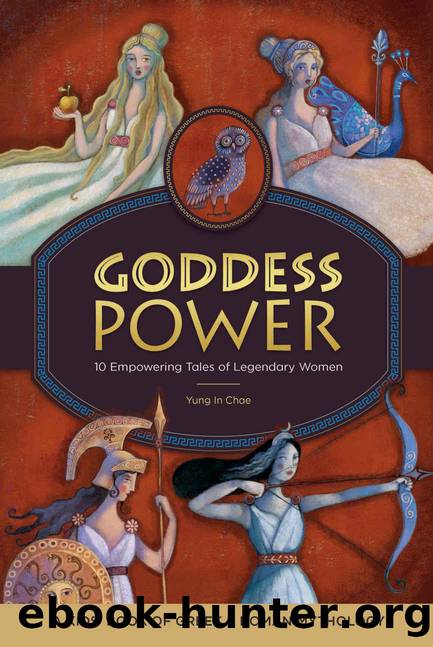Goddess Power: A Kids' Book of Greek and Roman Mythology: 10 Empowering Tales of Legendary Women by Yung In Chae

Author:Yung In Chae [Chae , Yung In]
Language: eng
Format: epub
Publisher: Rockridge Press
Published: 2020-01-21T05:00:00+00:00
THE MUSES
MYOO-zuhz
GODDESSES OF INSPIRATION
FAMILY Mnemosyne (mother)
Zeus (father)
Each other (sisters)
Various half-siblings
SYMBOLS Writing tablet, stylus, scroll, books, instruments, masks, veil, globe, compass
STRENGTH The arts
Once in a while, artists sit down to draw a picture, compose a song, write a poemâbut nothing happens. The inspiration just wonât flow, like a clogged fountain. In these situations, they have to call upon the Muses.
The Muses were the nine daughters of Mnemosyne, the goddess of memory, who was the Titaness daughter of Gaia and Uranus. Once, during a period of melancholy, Mnemosyne spent nine nights with Zeus. Nine months later, she gave birth to nine children:
â¢Calliope, the leader, was the Muse of epic poetry. She held a writing tablet and stylus pen.
â¢Clio was the Muse of history. She kept a scroll and a pile of books with her at all times.
â¢Erato was the Muse of lyric poetry, in particular love poetry. She held a stringed musical instrument called a cithara, which is a type of lyre.
â¢Euterpe was the Muse of music. She often played the aulos, a Greek flute.
â¢Melpomene was the Muse of tragedy. She carried a tragic mask, the kind that people wore on stage for performances of tragedies.
â¢Polyhymnia was the Muse of hymns. She wore a veil and was extremely serious, always pondering one issue or another.
â¢Terpsichore was the Muse of dance. She loved to dance while playing the lyre, a laurel wreath nestled in her hair.
â¢Thalia, the Muse of comedy, had a comedic mask. She was joyous and excelled at making people laugh.
â¢Urania was the Muse of astronomy. She used a globe and compass to look at the stars and interpret their positions.
No one was better than the Muses at their various arts. But that didnât stop some people from trying to outdo them anyway.
One day, Athena decided to pay a visit to the Muses, her half-sisters, in their valley on Mount Helicon: a stunning dimple of trees and caves and flowers. There was also a spring, Hippocrene, that the winged horse Pegasus had created by sinking his hoof into the ground. The beauty of Mount Helicon was inspiring enough, but the waters of Hippocrene actually had the power to give inspiration to poets who drank from it.
Here, in this pretty pocket, Athena found all of the Muses sitting together. She stopped to admire their home and especially Hippocrene, which she had never seen. Urania rose when she saw Athena approach and pulled her into a hug.
âI love the new spring,â Athena said when Urania let her go. âI heard Pegasus made itâis that true? Youâre very fortunate to live in such a place.â
âYes, our home is wonderful. But nowhere is safe these days,â Polyhymnia said solemnly. âWeâre still recovering from the time we were passing through the lands of King Pyreneus and he tried to trap us in his house.â
âAnd donât forget the Pierides,â Clio jumped in.
Athena was curious. âThe Pierides?â
So Urania told Athena the story of the king and princesses who were foolish enough to take on the Muses.
Pierus was the king of Emathia in Macedon.
Download
This site does not store any files on its server. We only index and link to content provided by other sites. Please contact the content providers to delete copyright contents if any and email us, we'll remove relevant links or contents immediately.
The Mayflower and the Pilgrims' New World by Nathaniel Philbrick(4495)
I'm Still Scared by Tomie dePaola(4376)
Bloody Times by James L. Swanson(4365)
Pocahontas by Joseph Bruchac(4247)
Bomb: The Race to Build--And Steal--The World's Most Dangerous Weapon (Newbery Honor Book) by Steve Sheinkin(3935)
Flesh and Blood So Cheap by Albert Marrin(3830)
An American Plague by Jim Murphy(3760)
Little Author in the Big Woods by Yona Zeldis McDonough(3514)
The Giant and How He Humbugged America by Jim Murphy(3441)
Hello, America by Livia Bitton-Jackson(3161)
The President Has Been Shot!": The Assassination of John F. Kennedy by Swanson James L(3089)
Harry Potter: A History of Magic by British Library(3040)
The Landing of the Pilgrims by James Daugherty(2939)
Gettysburg by Iain C. Martin(2830)
The Extraordinary Suzy Wright by Teri Kanefield(2713)
Ben Franklin's Almanac by Candace Fleming(2524)
The Impossible Rescue by Martin W. Sandler(2335)
Bloody Times: The Funeral of Abraham Lincoln and the Manhunt for Jefferson Davis by James L. Swanson(2111)
Who Was Louis Braille? by Margaret Frith(1976)
